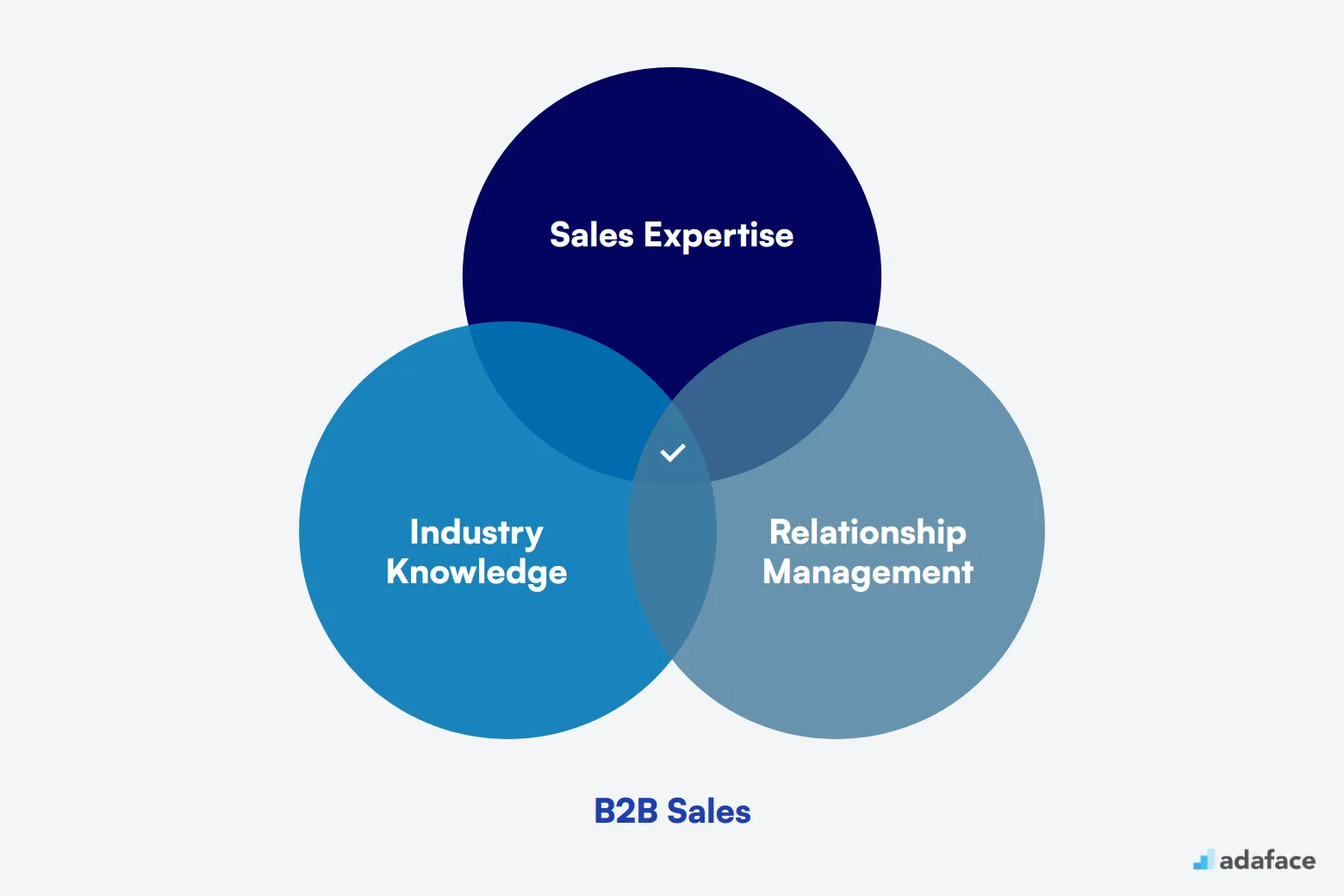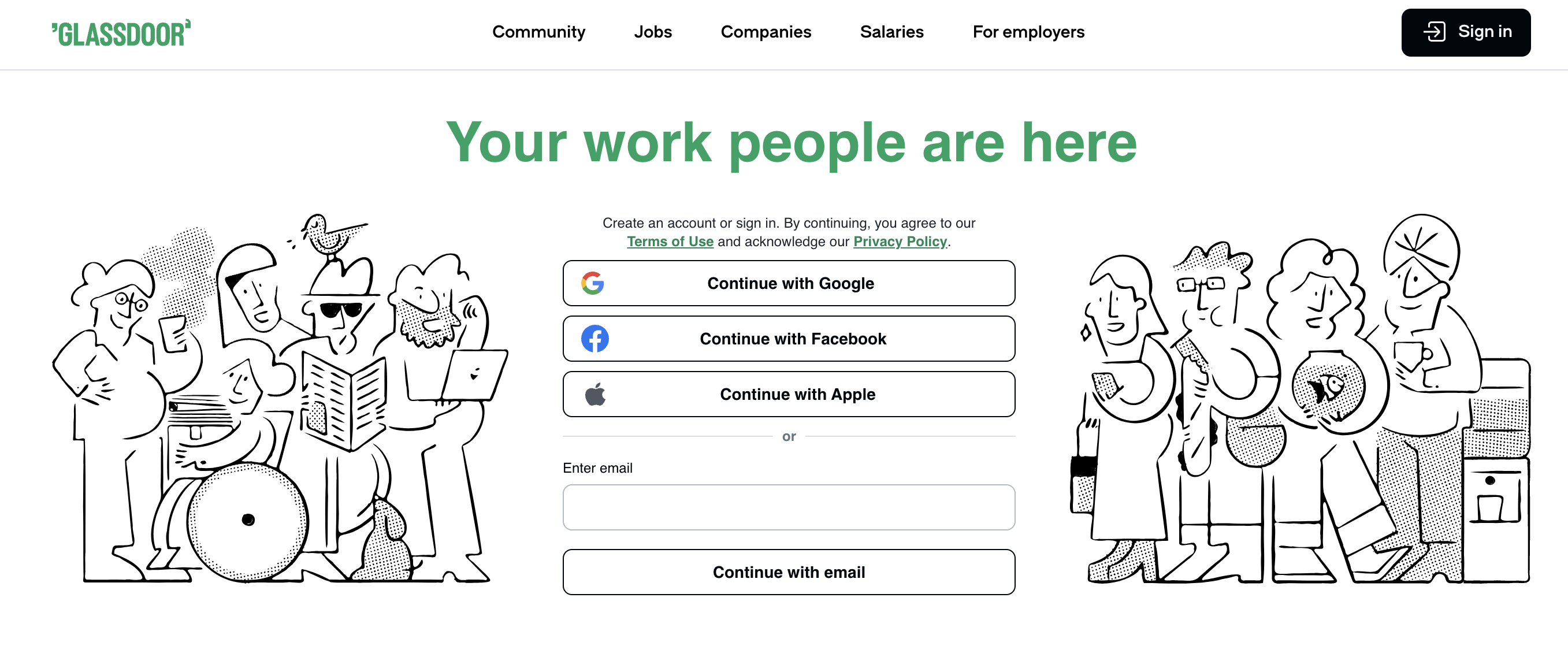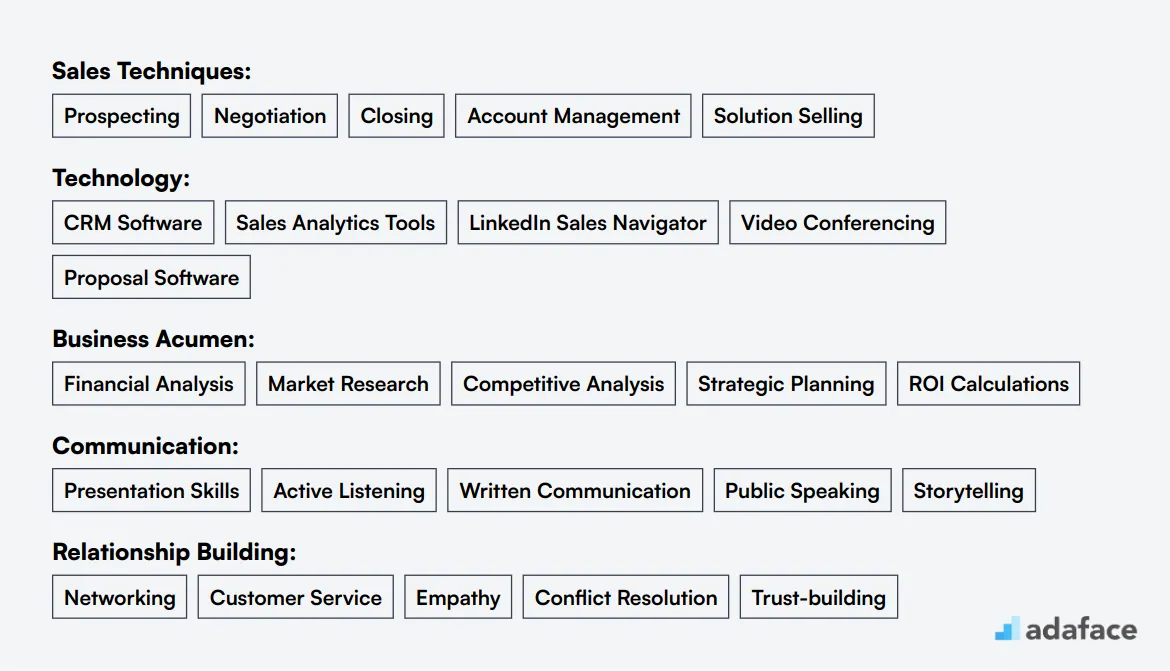As a recruiter or hiring manager, finding the right B2B sales professional can significantly impact your company's bottom line and market presence. B2B sales roles require individuals who can build relationships, understand complex product offerings, and close high-value deals. However, companies often struggle to identify candidates with the right balance of technical skills and interpersonal acumen, leading to mismatches and high turnover rates.
In this article, we address the key aspects of hiring B2B sales professionals, including necessary skills, where to find top-tier talent, and how to assess candidates effectively. Whether you're using pre-employment screening tests, such as those available from Adaface, or structuring your interview process, we provide actionable insights to help you hire the best candidates.
Table of contents
Why Hire B2B Sales Professionals?
B2B sales professionals are key to driving revenue growth for businesses selling to other companies. They help identify and solve complex business problems, build long-term relationships with clients, and navigate lengthy sales cycles.
To determine if you need B2B sales hires, consider your current challenges:
- Are you struggling to reach decision-makers in target companies?
- Is your sales pipeline not growing fast enough?
- Do you need help articulating your value proposition to potential clients?
If these issues resonate, it may be time to bring on dedicated B2B sales talent. For companies just testing the waters, working with a sales consultant initially can provide valuable insights before committing to full-time hires.

What Does a B2B Sales Professional Do?
A B2B sales professional focuses on selling products or services to other businesses rather than individual consumers. They build relationships with key decision-makers in target companies, understand their needs, and propose solutions that can benefit their business operations.
The day-to-day responsibilities of a B2B sales professional include:
- Researching potential clients and industries
- Cold calling and email outreach to generate leads
- Giving product demonstrations and presentations
- Negotiating contracts and closing deals
- Maintaining relationships with existing clients
- Collaborating with marketing and product teams
- Analyzing sales data and market trends
- Assessing and improving their sales skills to stay competitive
Key Skills and Qualifications for B2B Sales Professionals
When hiring for B2B sales, it's important to distinguish between must-have skills and nice-to-have qualifications. The ideal candidate profile can vary based on your company's specific needs and industry. Here's a quick guide to help you identify the essential and preferred attributes for a successful B2B sales professional.
Required skills typically include a proven track record in B2B sales, strong communication abilities, and proficiency with CRM software. On the preferred side, you might look for industry-specific experience or advanced degrees. Remember, assessing sales skills effectively is crucial for finding the right fit.
Keep in mind that while technical skills are important, soft skills like relationship building and adaptability often play a significant role in B2B sales success. Balance your requirements accordingly to attract well-rounded candidates who can drive results for your organization.
| Required skills and qualifications | Preferred skills and qualifications |
|---|---|
| Proven track record of successful B2B sales experience | MBA or advanced degree in a relevant field |
| Strong communication and interpersonal skills | Experience in the specific industry or market sector |
| Ability to understand and articulate complex product offerings | Multilingual capabilities |
| Proficiency in CRM software and sales tools | Proven leadership or mentoring experience |
| Bachelor's degree in Business, Marketing, or related field | Certifications in sales methodologies (e.g., Sandler, SPIN) |
Top Platforms to Find B2B Sales Talent
Now that you have a well-crafted job description, it's time to list your B2B sales position on job boards to attract potential candidates. The right platform can significantly boost your chances of finding qualified sales professionals. Let's explore some of the best options available for sourcing B2B sales talent.
LinkedIn Jobs
Ideal for posting full-time B2B sales positions. Large professional network allows for targeted job listings and easy candidate searching.

Indeed
Widely used job board for posting various B2B sales roles. Offers a large candidate pool and resume database for efficient hiring.

Glassdoor for Employers
Effective for employer branding and attracting informed candidates. Allows posting of B2B sales jobs alongside company reviews and insights.

Other notable platforms include AngelList Jobs for startups, SalesJobs.com for niche sales roles, and Remote Sales Heads for remote positions. Dice is great for tech-focused B2B sales, while ZipRecruiter uses AI matching for efficient hiring. When choosing a platform, consider factors like your company size, industry, and specific hiring needs to find the best fit for your B2B sales recruitment efforts.
Keywords to Look for in B2B Sales Resumes
Screening resumes is a smart way to narrow down the pool of candidates for B2B sales roles. Given the number of applications received, it's important to identify potential fits based on specific skills and experiences from the get-go.

When manually screening resumes, focus on identifying keywords that indicate a strong match for the role. Proven track record in sales, strong communication skills, understanding of complex products, and proficiency in CRM software are some primary keywords to look out for. Doing this helps in shortlisting resumes that are most likely to meet your requirements.
Using AI tools like ChatGPT can streamline the screening process. These tools can analyze resumes to identify the most relevant candidates based on the keywords you provide, saving you time and effort.
Here's a sample prompt for using AI to screen resumes effectively:
TASK: Screen resumes for B2B sales role
INPUT: Resumes
OUTPUT: For each resume, provide the following information:
- Email ID
- Name
- Matching keywords
- Score (out of 10 based on keywords matched)
- Recommendation (briefly explain if the candidate should be shortlisted)
- Shortlist (Yes, No, or Maybe)
RULES:
- If unsure about a candidate's fit, mark as Maybe
- Keep recommendations concise
KEYWORDS DATA:
- Sales Expertise (Prospecting, Negotiation, Closing)
- Technology (CRM Software, Sales Analytics Tools)
- Communication (Presentation Skills, Active Listening)
Utilize such structured approaches for a systematic and objective assessment of resumes, ensuring you find the best fit for your organization.
Recommended skills tests for assessing B2B Sales candidates
Skills tests are an effective way to evaluate B2B sales candidates beyond their resumes. They provide objective insights into a candidate's abilities and potential performance. Here are five key tests we recommend for assessing B2B sales professionals:
Sales Aptitude Test: This sales aptitude test evaluates a candidate's natural selling abilities, including prospecting skills, closing techniques, and objection handling. It helps identify candidates with strong sales instincts and potential.
Business Development Test: Use a business development test to assess a candidate's ability to identify new opportunities, develop relationships, and grow accounts. This test is particularly relevant for B2B sales roles focused on expanding client portfolios.
Communication Test: Effective communication is key in B2B sales. A communication test evaluates a candidate's verbal and written skills, ensuring they can articulate value propositions clearly to potential clients.
Account Management Test: For B2B sales roles involving ongoing client relationships, an account management test is valuable. It assesses skills in maintaining and growing existing accounts, which is often a significant part of B2B sales.
Cognitive Ability Test: B2B sales often involves complex problem-solving and quick thinking. A cognitive ability test can help gauge a candidate's analytical skills and ability to process information rapidly, which are valuable in navigating complex sales scenarios.
Effective Case Study Assignments for Hiring B2B Sales Professionals
Case study assignments are a powerful tool for evaluating candidates in B2B sales roles, offering a glimpse into their real-world application of skills. However, they have drawbacks like being lengthy, which can lead to low completion rates and the possibility of losing top talent. Despite these challenges, well-crafted case studies can be instrumental in identifying the right candidates.
Market Entry Strategy Case Study: This assignment evaluates a candidate’s ability to analyze potential markets and devise strategies for successful entry. It's recommended because it tests strategic thinking and market analysis skills, which are key for B2B sales roles. For more on what skills are needed, refer to skills required for B2B sales.
Product Pitch Presentation: This case study involves crafting and delivering a pitch for a hypothetical product. It is perfect for assessing a candidate’s communication and persuasion abilities, vital for closing deals in B2B settings.
Customer Relationship Management Case Study: This assignment focuses on maintaining and building strong customer relationships. By simulating real-life scenarios, candidates demonstrate their proficiency in CRM, aligned with the expectations outlined in a B2B sales job description.
Structuring the Interview Stage for B2B Sales Hiring
After candidates pass initial skills assessments, it's crucial to conduct technical interviews to evaluate their hard skills in depth. While skills tests help filter out unqualified applicants, they aren't sufficient for identifying the best-fit candidates. Technical interviews allow you to dive deeper into a candidate's capabilities and suitability for the B2B sales role.
Consider asking these sample interview questions: 1) 'Describe your approach to qualifying leads in a B2B setting.' 2) 'How do you tailor your sales pitch for different decision-makers?' 3) 'Share an example of how you've used data to inform your sales strategy.' 4) 'What methods do you use to stay updated on industry trends and competitors?' 5) 'How do you handle objections related to price in complex B2B sales?' These questions help assess the candidate's practical experience, strategic thinking, and ability to navigate the B2B sales landscape.
What's the difference between a Business Development Representative and an Account Executive?
In the B2B sales world, Business Development Representatives (BDRs) and Account Executives (AEs) play distinct roles that are often confused. While both contribute to the sales process, their focuses and responsibilities differ significantly.
BDRs are the frontline soldiers of sales, focusing on lead generation and initial contact. They research prospects, reach out through various channels, and qualify leads. Their success is measured by the number of qualified leads they generate, working with a lead quota rather than a revenue target.
AEs, on the other hand, are the closers. They take over qualified leads from BDRs and guide them through the later stages of the sales cycle. AEs are skilled in negotiation, relationship management, and closing deals. Their performance is typically measured by revenue generated and deals closed.
The career progression also differs between these roles. BDR is often an entry-level position, while AE is a mid to senior-level role. Many AEs start their careers as BDRs, honing their skills required for B2B sales before moving up the ladder.
Understanding these differences is crucial for hiring managers and recruiters. It helps in crafting accurate job descriptions, setting appropriate expectations, and identifying the right candidates for each role in the B2B sales team.
| Business Development Representative | Account Executive | |
|---|---|---|
| Role Focus | Lead generation | Closing deals |
| Customer Interaction | Initial contact | Negotiation and closing |
| Sales Cycle Stage | Early stage | Late stage |
| Job Objective | Qualifying prospects | Achieving sales targets |
| Key Skills | Research, Outreach, Communication | Negotiation, Relationship Management, Closing |
| Sales Quota | Lead quota | Revenue quota |
| Metrics of Success | Number of qualified leads | Revenue generated |
| Career Progression | Entry-level role | Mid to senior-level role |
What are the ranks of B2B Sales?
In the B2B sales sector, there are several distinct roles that often get confused with one another. Understanding the hierarchy will help you make informed hiring decisions and ensure you find the right fit for your organization.
• Sales Representative: This is typically an entry-level position where individuals are responsible for generating leads and selling products or services. Their primary focus is on building relationships with potential clients and meeting sales targets.
• Account Executive: These professionals handle a portfolio of clients and work to deepen relationships while ensuring client satisfaction. They often take over from sales representatives once leads are qualified.
• Sales Consultant: Sales consultants work closely with clients to understand their needs and recommend tailored solutions. They often possess specialized knowledge about the products or services they are selling, which helps them provide value to clients.
• Sales Lead: A sales lead oversees a team of sales representatives and is responsible for meeting team sales goals. They mentor junior sales staff and develop strategies to improve performance.
• VP of Sales: This is a senior leadership role that focuses on the overall sales strategy of the organization. The VP is responsible for leading the sales team and ensuring alignment with the company's business objectives.
Hire the Best B2B Sales Professionals
Throughout this blog post, we have explored the various facets of hiring B2B sales professionals, from understanding their roles and skills to effectively evaluating candidates through interviews and assignments. We've discussed platforms for finding talent, the importance of a well-structured interview, and the distinction between roles such as Business Development Representatives and Account Executives.
If there's one takeaway from this discussion, it's the importance of using accurate job descriptions and skills tests to enhance hiring accuracy. Leveraging the right Sales Aptitude Test or Business Development Test can significantly streamline the process and ensure that you identify candidates with the right skills for your B2B sales needs.
Sales Aptitude Test
FAQs
A B2B sales professional is responsible for selling products or services from one business to another. They build relationships with clients, understand their needs, and offer solutions that enhance business operations.
Look for skills such as communication, negotiation, relationship-building, strategic thinking, and industry knowledge. Technical competencies, such as CRM proficiency, can also be important.
You can find B2B sales candidates on professional networking sites, industry-specific job boards, and through recruitment agencies. Platforms like Adaface offer tools to streamline your hiring process.
Use skills assessments, situational judgment tests, and structured interviews. Tools like Adaface assessments can help evaluate candidates' abilities in real-world scenarios.
A Business Development Representative focuses on generating leads and qualifying prospects, while an Account Executive is responsible for closing sales and managing client relationships.
Ask questions that gauge their sales strategies, problem-solving skills, and ability to handle rejection. You can refer to Adaface's interview questions for more ideas.
Common ranks in B2B sales include Sales Representative, Account Executive, Sales Manager, and VP of Sales. Each role has different responsibilities and focuses within the sales process.

40 min skill tests.
No trick questions.
Accurate shortlisting.
We make it easy for you to find the best candidates in your pipeline with a 40 min skills test.
Try for freeRelated posts
Free resources



